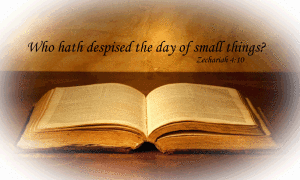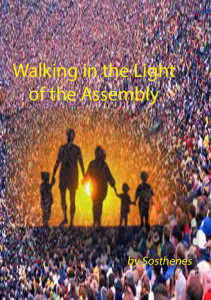This was the subject of a letter, originally in French (JND French Letters No 436) and translated by myself. The translation has been reviewed by another brother. It is an alternative translation to that in JND’s Collected Writings. How to Know the Will of the Father vol 16 (Practical 1) p19
DJR Translation
436
Dear Brother
You could not suppose that a child who habitually neglected its father, and was always wholly indifferent to his mind and will, would not know what would please its parent when a difficult circumstance presented itself. There are certain things which God intentionally leaves in generalities, in order that the state of a soul may be proved. If, instead of the child, a wife was found there, there would probably be no hesitation in her mind; she would know immediately what would please her husband; even where he had expressed no positive will about the circumstance in question. Now you cannot escape this trial; God will not allow His children to escape it. “If thine eye be single, thy whole body shall be fun of light.” (Matt 6: 22). This easy and comfortable means of knowing God’s will does not exist without reference to the state of our own soul.
There is something else. Very often we are of too much importance in our own eyes and we imagine, however wrongly, that God has some will for us in the circumstances in which one is working. In fact, God has nothing to tell us thereon, and all the agitation provoked in us by the thing which concerns us is only evil. The will of God is that we should know to take our place quietly, an insignificant place. At other times, we seek to know God would have us to act in circumstances in which His only will is that we should not be found there at all, and the first thing to which our conscience would lead us, if it were really in activity, would be to make us leave them. Our own will has set us there, and we would like nevertheless to lean on the hand of God and to be directed by Him in the path of our own will. Such is a very common case.
Be assured that, if we kept ourselves near enough to God, He would not leaveus in ignorance of His mind. In a long and active life, God, in His love, may make us feel our dependence when we have a tendency to act according to our own will, and does not immediately reveal His own; but the principle remains, whatever it is: “if thine eye be single, thy whole body shall be full of light”. Whence it is certain that, if the whole body is not full of light, the eye is not single. You will say to me, That is poor consolation. No, it is sweet and precious consolation for those whose desire is to have the eye single and to walk with God – not only to delivered objectively, so to speak, by the knowledge of His will, but to walk with Him. “If any man walk in the day, he stumbleth not, because he seeth the light of this world. But if a man walk in the night, he stumbleth, because there is no light in him” (John 11: 9-10). It is always the same principle. “He that followeth me shall not walk in darkness, but shall have the light of life” (John 8: 12). You will seek in vain to exempt yourself from this moral law of Christianity: the thing is impossible. “For this cause we also, since the day we heard it, do not cease to pray for you, and to desire that you may be filled with the knowledge of His will in all wisdom and spiritual understanding, that ye might walk worthy of the Lord unto all pleasing, being fruitful in every good work, and increasing by the knowledge of God” (Col 1: 9-10). The connection between these things is of incalculable value for the soul. We need to know the Lord to walk in a way worthy of Him; and we grow in the knowledge of God. “And this I pray, that your love may abound yet more and more in knowledge and in all judgment; that ye may approve things that are excellent; that ye may be sincere and without offence till the day of Christ” (Phil 1: 9-10). Finally, “the spiritual discerns all things and he himself is discerned of no man” (1 Cor 2: 15).
It is then the will of God, and a will of grace, that men should be capable of discerning His will other than according to their own spiritual state, and, in general, when we think that we are carrying a judgment of the circumstances, it is God who is judging us, us and our state. Our only business, I repeat, is to keep ourselves close to God. It would not be the love of God to leave us to discover His will without that. Such a thing might be convenient to a director of consciences; but the love of God cannot allow us to be spared the discovery and the chastisement of our own moral state. Thus, if you seek how you may discover the will of God in the details, and apart from this state, you are seeking evil; and this is seen every day. You will find a Christian in doubt and perplexity, where another, more spiritual, sees as clear as the day, surprised at what is making no difficulty, and understanding that it is quite simply the other’s state which hinders him from seeing it. “He that lacketh these things is blind, and cannot see afar off” (2 Pet 1: 9).
As regards circumstances, I believe that a person may be guided by them; and Scripture has pronounced on that, whatever it may be called: to be “held in with bit and bridle”; “I will instruct thee, and teach thee in the way which thou shalt go: I will guide thee with mine eye” (Ps 32). Such is the promise and privilege of faith which keeps near enough to God to know only His mind towards him; He being faithful to direct thus and promising to do so. God exhorts us not to be as the horse and the mule which cannot receive intelligently from their master the communication of his mind and his desires; they need to be held in with bit and bridle, which is better than to stumble, to fall or to run counter to the one who leads; but this is after all a sad state. That is therefore what it is to be guided by circumstances. God is full of goodness in concerning himself thus with us but it is a sad on our part.
Here, however, we must distinguish between judging circumstances, and acting in the midst of them; he who is led by them always acts blind as to knowing the will of God. There is absolutely nothing moral in that direction; it is an external force that exercises a control. Now it is very possible that I may have no idea beforehand of what I shall do, and that: I do not know the circumstances in which I may be found, and cannot consequently make any resolution in advance; and yet,the instant they present themselves, I judge with the clearest divine judgment what is the path of God’s will, what is the mind and power of the Spirit in the midst of these circumstances, and this demands precisely the highest characterof spirituality; instead of being led by circumstances, on is led by God in them, being near enough to God to be able to judge what is suitable, as soon as it is presented. ‘Impressions’ are not everything, God can suggest them no doubt, and by His Spirit, He does suggest a thing to the mind; but when it is perceived, its moral character will be as clear as the sun at noon-day. In response to prayer, God can remove from our heart certain carnal influences, and so leave their power in the spirit to certain spiritual influences which give importance to a duty, which had been perhaps entirely obscured by preoccupation caused by some object of our desire. This may be even be seen between two individuals: one may not have the spiritual discernment to discover what is right; but if another shews the good to him, he sees it clearly himself. All are not highway engineers, but a waggoner knows well enough a good road when it is made. Thus the impressions which come from God do not always remain simple impressions, but they are usually clear at the same time as they are produced. I do not doubt, however, that if we walk with Him, and if we listen to Him, God often produces this clarity in the soul.
If Satan, as you put it, raises obstacles, it only shows that they are only obstacles (allowed God) for a good reason, obstacles raised by the accumulation of evil in the circumstances which surround us by the power of evil over other people.
Your third question supposes a person acting in ignorance of God’s will, which should never be the case. The only rule that can be given as to this is, never to act when we do not know this will. If you act without knowing it, you will be at the mercy of circumstances. God overrules all, for this is the case supposed by your question; But why act in such a way as would be if I were ignorant of the will of God? He will stop me perhaps, because, if I do not walk sufficiently near to God in the sense of my nothingness, I will perhaps lack the faith to accomplish what we have faith enough to discern.
If we are doing our own will or are negligent in our walk, God in His grace may warn us by a hindrance if we pay attention to it, whilst “the simple pass on and are punished” Prov 22: 3). God may permit, where there is much activity and labour, that Satan should raise up hindrances, in order that we may be kept in His dependence; but God never permits Satan to act otherwise than on the flesh. He does evil, if we leave the door open between us and him, because we are away from God; but otherwise God uses it only as an instrument to test us to take us away or correct what would be a danger to us, or something that would tend to exalt us. God allows Satan to cause suffering, and the flesh and the outward mind, in order that the inward man may be kept clean and safe. If it is a question of anything else, we have only to take our “buts” and open the door to the enemy to trouble us by doubts and difficulties as if they were between God and us, because we no longer “see far”, for “he that is begotten of God keepeth himself, and that wicked one toucheth him not”.
Finally, the question is wholly moral. If any particular question is raised which at the first blush we cannot solve, we shall find very often that it would not have arisen, if our position were good, if spirituality had guarded and kept us instead of making us err. In such a case, we have only one thing to do, which is to humble ourselves as to matter which it is about, then to examine whether Scripture does not present some principle suitable to direct us. Here evidently spirituality is everything. Where it can be applied, the principle of looking at what Jesus would have done in such and such a case is excellent, but how often we are not in the circumstances in which He would be found.
It is often useful to ask ourselves whence comes such a desire with us, or the thought of doing this or that; I have found that this alone decides more than half of the difficulties in which men can be found. The rest of those which remain are the result of haste, or of a former evil. If the thought is of God and not from the flesh, then we have only to wait on God as to the manner and means by which we shall soon be directed. There are cases we need direction without motives, as when we hesitate about whether to make one or another. A life of more ardent charity, or a charity exercised in a more intelligent way, or set in activity in communion with God, will clear the motives of charity which were not but selfishness. And if, you ask, charity or obedience are not in question? Well! Then it is for your first to give me a reason, a motive, for acting in whatever way it is. If it is your own will that you are pressing, you cannot make the wisdom of God te servant of your will; this is another numerous class of difficulties that God will never solve. In these cases, He will in grace teach us obedience, and will show us how much time we have lost in our own activity.
Finally “the meek will he guide in judgment, and the meek will he teach his way” (Ps 25: 9).
I have given you all that comes to mind at this moment, and little satisfaction, I fear. But remember only that the wisdom of God conducts us in the way of God’s will. If our own will is in activity, God cannot be the servant of it; that is the first point to discover. It is the secret of the life of Christ. I know no other principle that God makes use of, however He may pardon and overrule all. You have asked me for direction: God leads the new man who has no other mind than Christ, and who mortifies the old man. He purifies us thus that we may bear fruit.
…
Like this:
Like Loading...





